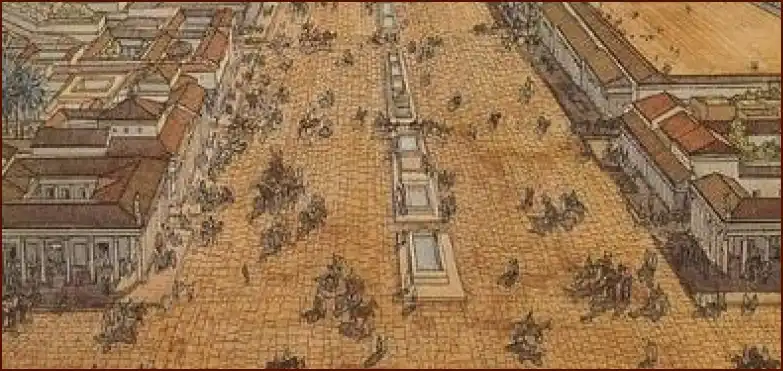No institution better represents the intellectual ambition of the Hellenistic age than the legendary Library of Alexandria. Founded by the Ptolemaic dynasty in Egypt in the 3rd century BC, it was more than just a collection of scrolls; it was a comprehensive research center that aimed to gather and preserve all of the world’s knowledge. Its legacy is a testament to the period’s shift toward a scholarly, text-focused culture that laid the groundwork for modern academic study.
Table of Contents
Attached to a research institute known as the Mouseion, the Library attracted the greatest minds of the era, from poets to scientists. These scholars were tasked not only with collecting texts but also with editing, translating, and organizing them, effectively creating the first standardized literary canon and inventing the disciplines of textual criticism and bibliography.
📚 Building a Universal Collection
The mission of the Library of Alexandria was astonishingly ambitious: to acquire a copy of every book in the known world. The Ptolemaic rulers pursued this goal with vigor, employing various methods to build their collection. Royal agents were sent to book markets across the Mediterranean to purchase scrolls. Legend has it that any ship docking in Alexandria’s harbor was required to surrender its books to be copied, with the copies returned to the owners and the originals kept for the Library.
This massive undertaking resulted in an unparalleled collection, with estimates ranging from 40,000 to 400,000 scrolls. This vast repository of knowledge covered every subject imaginable:
- Literature and Poetry
- Philosophy and Rhetoric
- Mathematics and Astronomy
- Medicine and Natural History
This concentration of texts made Alexandria the undisputed intellectual capital of the ancient world.
🔬 A Center for Scholarship and Innovation
The Library was not merely a passive archive; it was a vibrant center of scholarly activity. The resident scholars of the Mouseion were pioneers of literary and scientific study. The first head librarian, Zenodotus, began the monumental task of editing the works of Homer, comparing different manuscripts to establish a more authentic text. This work was continued by his successors, Aristophanes of Byzantium and Aristarchus, who invented systems of accentuation and punctuation that we still use in some form today.
A scholar named Callimachus created the *Pinakes*, a 120-volume catalog that listed works by genre and author, complete with biographical information. This was the first library catalog of its kind and a foundational work of literary history. The Library’s influence extended beyond literature, fostering scientific breakthroughs by figures like Euclid (geometry) and Eratosthenes, who famously calculated the circumference of the Earth with remarkable accuracy.
More Topics
- How Philosophy Influenced Hellenistic Writing
- How to Understand the Hellenistic Book Roll
- How to Read Hellenistic Didactic Poetry
- How Literary Rivalry Shaped Hellenistic Poetry
- How to Appreciate Hellenistic Women Poets
- How Scholarship Became Literature in the Hellenistic Era
- How Royal Patronage Shaped Hellenistic Literature

